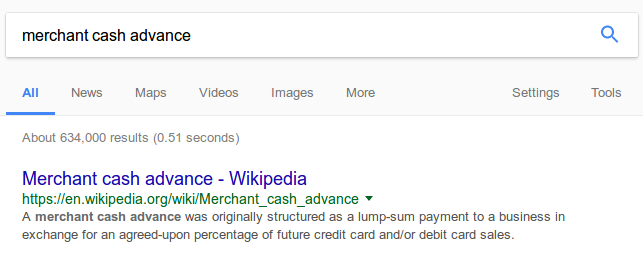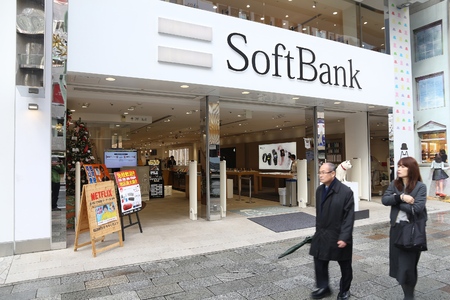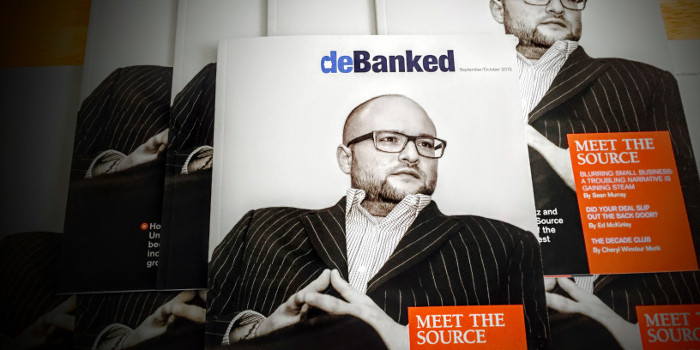Archive for 2017
Bizfi Alum Jared Weitz Reflects on Demise of Former Employer and Rise of UCS
October 9, 2017 Jared Weitz has come a long way since his earlier days as one of the original Bizfi employees. Today he’s at the helm of online funding marketplace United Capital Source (UCS), which has been on a tear since deBanked last spoke with Weitz a couple of years ago. The UCS founder and chief executive took some time to revisit with us about having to painfully watch the demise of his former employer, which is where he cut his teeth in this business, and the rise of his own company UCS as a funding marketplace.
Jared Weitz has come a long way since his earlier days as one of the original Bizfi employees. Today he’s at the helm of online funding marketplace United Capital Source (UCS), which has been on a tear since deBanked last spoke with Weitz a couple of years ago. The UCS founder and chief executive took some time to revisit with us about having to painfully watch the demise of his former employer, which is where he cut his teeth in this business, and the rise of his own company UCS as a funding marketplace.
In some ways, the more things change the more they stay the same. Since the last time Weitz spoke with us, the company’s location remains in the heart of Times Square in New York, and UCS has grown its staff by only four people including two sales reps. What has changed, however, is the amount of funding that the company has done and the size of the average transaction, all of which have blossomed.
“When we first spoke a few years ago we were doing $8 million to $10 million a month in funding volume. Now we are doing between $14 million and $16 million per month,” said Weitz.
He added that where the company differentiates itself is that while a few years ago the products they were selling were predominately in the sub-prime space now they sell other products, which allows merchants to “swim upstream” when they qualify for that.
The result has been bolstered partnerships and product offerings and an average loan size that has jumped from $30,000 to $40,000 per deal to a range of $500,000 to $2 million.
“We opened up the funnel to the kind of relationships we’re able to broker and the kinds of financings we’re able to offer. We’re playing in the field of SBAs, account receivables financing, lines of credit and asset backed loans. By offering these products our volume has jumped significantly and allowed us to talk to different referral partners.”
UCS does all of its own marketing and generates leads for their in-house sales reps. Those sales reps take a file from open to close and they analyze the small business owner’s needs on a consultative call.
“We understand their business and their pain points. The first question we ask isn’t how much do you need but what’s paining you in your business today that we can help you with?”
One such business owner recounted his experience with UCS to deBanked, saying that traditional banks were “an absolute pain” to secure funding. He spoke of the “very stressful” and time-consuming process of applying for a loan, saying he doesn’t have time to “jump through a million hoops to get a loan.”
“When I was initially looking to curb my temporary cash flow problem, I searched online for the best alternatives to traditional bank loans. I read all the reviews on companies and decided to call UCS,” the business owner told deBanked, adding that he’s been a UCS repeat customer for a number of years and is especially fond of the ease at which the process is completed.
“I could literally call Jared today and have six figures in my account tomorrow. The best part is the pay back process. They only take funds when I run credit card transactions. So, in my slow months, I don’t have to stress and worry about repaying the loan. UCS is a perfect fit for me,” the business owner said.
Eye Opener
As the seventh or eighth employee of Bizfi, Weitz really has been part of the evolution of online funding. He says the rise and fall of Bizfi has been an “eye opener” for him.
“It caused a bunch of funding companies to be a little gun shy when it comes to funding. I told my guys this too shall pass. People are shaken and wondering if it’s a larger global issue. Thankfully it’s not a global issue. There are plenty of funding companies that are well backed that are still funding. My group is well able to pick it back up. We have signed up with more funding companies to increase our offerings and make sure we have no concentration issues,” said Weitz.
And although he left the company to eventually launch UCS, which has proven to be a prudent move, he has nothing but respect for his former employer.
“My history there is very deep and I’ve got a genuine love for the founders of the company. It’s where I cut my teeth. I was really sad the day I heard they’re not funding anymore.”
In fact, Bizfi was one of the funders that UCS counted among its partners.
“We had a good book there. We started to see problems and began to shift where our new business was going. Thankfully it didn’t affect me. But it showed me that you should sign up with more funding companies. If you think the mix should be X go 50% more and be super cautious. This approach has worked out for us,” he said.
Weitz has advice for other funders that might be looking to grow at lightning speed.
“Someone that’s growing so fast while they’re also innovating and looking to close larger transactions that bring them to a bigger place – that’s hard to do all at once. Driving at 200 MPH either works out well and takes you to the finish line or it doesn’t work out really well. It’s really unfortunate that it didn’t work out for them.”
 Deal Competition
Deal Competition
For its part, UCS competes with the likes of LendingTree and other online marketplaces, but that seems only to add an ounce of perspective to Weitz and the UCS team, driving them to adjust and remain nimble so that they can get the next deal.
“Healthy competition is good for us. We welcome anything like that. Some of my best learning experiences have been when we were beat out on a deal. I call the merchant personally and say hey, who gave you the deal? Honestly, I want to sign up with them and offer those rates to my clients. We form a friendship with both the funder and the small businesses,” he said.
UCS also counts some high-profile funders among its partners.
“We’ve worked with some funders forever and it’s been great. But we really had to also find folks that offer certain products but at a cheaper rate,” said Weitz, pointing to the scenario of a merchant having a few of those loans under their belt and improved credit as a result. “They are being solicited by depository banks and can qualify for that rate. We don’t want to lose the relationship. My thought process is sign up with similar folks with that product and when the time comes we can swim the merchant upstream.”
For instance, not all funders offer SBA loans but UCS has been doing so for the past two years. “It’s really kind of taken off for us over the last year. The same thing with accounts receivable and future order financing.”
UCS acts as both a broker and investor in their own deals, so they have a vested interest in the underwriting standards. “Investing with some of our funding partners on the syndication side allows us to have buying power and to take an actual interest in the merchant we’re dealing with,” said Weitz, adding that UCS takes a hybrid approach offering both a fully automated underwriting process for those merchants who want it but also having the capability to talk to the business owners, which is what the large majority of business owners prefer.
Google Restricts Ads for Merchant Cash Advances
October 8, 2017Google’s quest to stamp out payday loan advertisements from its paid search results has caused collateral damage to merchant cash advances. That’s because the two-word term cash advance, often synonymous with payday loan, appears to now have a blanket restriction that blocks ads whenever that term is included in search, regardless of the words that come before it or after it.

Merchant cash advances, however, are commercial factoring transactions with no relation to payday or consumer finance.
A user on the deBanked forum first alerted me on October 5th and deBanked conducted tests from internet connections in two states to see if we could replicate the results. Below is a sample of our results:
| Keyword | Google Adwords Status |
| cash advance | BLOCKED |
| merchant cash advance | BLOCKED |
| business cash advance | BLOCKED |
| business loan | ACCEPTED |
| loans | ACCEPTED |
| get a business loan | ACCEPTED |
| loan for my business | ACCEPTED |
| cash advance for my business | BLOCKED |
| business loan companies | ACCEPTED |
| merchant cash advance companies | BLOCKED |
| factoring or business loans or credit cards | ACCEPTED |
| factoring or business loans or merchant cash advances | BLOCKED |
| loan from ondeck | ACCEPTED |
| cash advance from ondeck | BLOCKED |
| consolidate loans | ACCEPTED |
| consolidate cash advances | BLOCKED |
No such block exists on rival search engine Bing.
Though Google has not said this, the mass removal of payday lending ads, once a massive source of revenue for them, is likely the result of government pressure. Over the last two years, federal regulators have begun targeting lead generation sites that direct users to lenders in a misleading manner.
Unless Google fixes the glitch that caused merchant cash advances to get wrapped up with consumer cash advances, the organic search results will experience a huge boost in value. Last month we reported that companies like OnDeck, Fundera, and Nerdwallet were winning the search engine optimization battle for several keywords including merchant cash advance. Absent any ads, those companies and several others will now benefit from a stream of free traffic and applicants for which their cost of acquisition will be zero dollars.
Perhaps little has been mentioned about this ban within the industry because the end result is FREE leads for those that rank well organically. Long live SEO!
Broker Fair 2018 – The Inaugural Conference for Merchant Cash Advance and Business Loan Brokers
October 5, 2017 New York, NY – Foinse, LLC, in collaboration with deBanked, is excited to announce Broker Fair 2018, the inaugural conference for merchant cash advance (MCA) and business loan brokers. Broker Fair 2018 is being held at The William Vale in Brooklyn on May 14, 2018. It will be the largest gathering of MCA and business loan brokers in the country.
New York, NY – Foinse, LLC, in collaboration with deBanked, is excited to announce Broker Fair 2018, the inaugural conference for merchant cash advance (MCA) and business loan brokers. Broker Fair 2018 is being held at The William Vale in Brooklyn on May 14, 2018. It will be the largest gathering of MCA and business loan brokers in the country.
This exclusive one-day event in New York City’s most vibrant and creative corner will offer brokers, lenders, funders, and service providers opportunities to learn, connect, and grow their businesses.
Broker Fair founder and deBanked Chief Editor Sean Murray, said “Online business lenders, MCA providers, and independent brokers employ thousands of salespeople to connect business owners with sources of capital. There are numerous products, tools, and resources out there now but the landscape remains fractured. Through Broker Fair, I want to empower the salespeople, empower the brokers. They’re the ones on the frontlines with America’s small business owners. I’ve been covering this space for seven years and was actually an MCA broker myself prior to that. I know the industry. A lot of folks and companies want to be successful but I know that they also want to have a positive impact on their customers and the industry they’re a part of. I want to facilitate that and more at Broker Fair.”
The three central tenets of the conference will be education, inspiration, and opportunities.
Registration is already open at http://brokerfair.org/pages/register/
To become a sponsor or inquire about the benefits of sponsorship, contact info@brokerfair.org or call 917-722-0808. Event sponsors can be viewed at: https://brokerfair.org/sponsors/
About Foinse, LLC
Foinse, LLC is an events company and the owner of Broker Fair 2018. For more information, visit: https://brokerfair.org/
About deBanked
deBanked® is a registered trademark of Raharney Capital, LLC and is the name of a print and online publication that has covered alternative finance including merchant cash advance and online business lending since 2010. deBanked is a presenting partner of Broker Fair 2018. For more information, visit: https://debanked.com/
Dear MCA and Business Loan Brokers, It’s Time
October 5, 2017 It’s been two years since the Year of the Broker was published. And it’s been many more than that since the last time I brokered a deal myself. Though I’ve only been writing about merchant cash advances (MCAs) and non-bank business loans for seven years here, my involvement in that industry started more than a decade ago. In all that time I’ve gone to countless trade shows, conferences, networking events, meetups and discussion sessions. To their credit, many of those provided excellent value across the spectrum of finance or payments, but none ever quite fully gripped an industry that is now pumping out approximately $15 billion to small businesses each year.
It’s been two years since the Year of the Broker was published. And it’s been many more than that since the last time I brokered a deal myself. Though I’ve only been writing about merchant cash advances (MCAs) and non-bank business loans for seven years here, my involvement in that industry started more than a decade ago. In all that time I’ve gone to countless trade shows, conferences, networking events, meetups and discussion sessions. To their credit, many of those provided excellent value across the spectrum of finance or payments, but none ever quite fully gripped an industry that is now pumping out approximately $15 billion to small businesses each year.
MCAs and online business loans are still overwhelmingly facilitated by salespeople, whether they’re employed by direct capital providers or independent sales organizations and brokers. Notably, a recent survey of industry CEOs suggested that in the last two years, the industry has come to rely even more on brokers for originations despite the belief that their reliance on them would decrease. An average of 64% of originations are currently coming from external sources/ISOs, the survey revealed.
Even salespeople at direct capital providers can find themselves playing the role of adviser or middleman when the solutions they offer in-house are not the right fit for a prospect. Small businesses need someone to help them navigate the massive universe of options and have that person be able to explain those options correctly. It only makes sense then that there would be an annual gathering of brokers, lenders, and MCA funders where all of those salespeople and their colleagues come together. Much to my disappointment (and I’m not alone in that) I’ve never found such an event.
I expect that will change in 2018. I truly believe dear friends that it’s time…
Update: Meet Broker Fair 2018
Updates On Several Industry Court Cases
October 4, 2017Curious to know the status of industry court cases we’ve reported on? Here’s an update on several:
| Case | When filed | Where pending | Status |
| Yellowstone Capital LLC and EBF Partners, LLC v. Corporate Bailout, LLC, Mark D. Guidubaldi & Associates, LLC dba Protection Legal Group, PLG Servicing, LLC, American Funding Group, Coast to Coast Funding, LLC, ROC Funding Group, LLC, ROC South LLC, and Mark Mancino. | 9/27/17 | New York State Supreme Court | Complaint filed. No anwswer filed yet |
| Sean Pullen, Christina Cane, Michael Cane, Michael Carrera, Matthew Taylor, and Yulia Zamaora v Social Finance, Inc. and Does 1-50 | 8/14/17 | Superior Court of California | SoFi filed an answer to the complaint on 9/15 |
| Craig Cunningham v. Mark D. Guidubaldi & Associates, LLC dba Protection Legal Group, and Corporate Bailout, LLC, Sanford J. Feder Esq, Mark D. Guidubaldi, Esq, Cashflow Care, LLC | 5/10/17 | Northern District of Texas | Motion for default judgment filed against Corporate Bailout on 9/12/17. Defendant never responded |
| Natures Market Corp v. Creditors Relief | 4/28/17 | New York State Supreme Court | Creditors Relief’s motion to dismiss and sanctions are still pending |
| Pearl Gamma Funding, LLC and Pearl Beta Funding, LLC v. Creditors Relief, LLC | 11/16/16 | New York State Supreme Court | Pearl has moved to dismiss Creditors Relief’s counterclaims |
| United States v. Sergiy Bezrukov | 10/26/16 | Western District of New York | The criminal indictment was amended on 8/3/17 to add more charges. Bezrukov is facing up to 30 years in prison |
| Ronald Bethune, on behalf of himself and all others similarly situated v. Lendingclub Corporation;WebBank, Steel Partners Holdings, L.P.; The Lending Club Members Trust; and does 1 through 10, inclusive | 4/6/16 | Southern District of New York | The judge granted the defendants motion to compel arbitration on Jan 30, 2017 |
| Kalamata Capital LLC v. Biz2Credit, Inc. and Itria Ventures, LLC | 12/8/14 | New York State Supreme Court | Kalamata plans to amend the complaint and the Court is scheduled to decide on the debate over whether certain documents should be sealed from public view |
| Federal Trade Commission v. AMG Services, Inc., et al. | 4/2/12 | District of Nevada | $1.3 billion judgment entered. Company owner Scott Tucker is also currently being tried criminally in the Southern District of New York for ill-gotten profits related to his payday lending empire. The jury is expected to decide the outcome this month |
Kabbage’s Petralia Talks Big Tech, Fintech and Lending
October 2, 2017 Kabbage co-founder and head of operations Kathryn Petralia was in New York last week for The Economist’s Finance Disrupted 2017 conference where she was a panelist on in an Oxford-style debate about whether tech giants Alibaba, Amazon, Apple, Facebook and Google pose a greater challenge to traditional banks than the fintech startup community. Her position is that no, they do not, and there appears to be room for both.
Kabbage co-founder and head of operations Kathryn Petralia was in New York last week for The Economist’s Finance Disrupted 2017 conference where she was a panelist on in an Oxford-style debate about whether tech giants Alibaba, Amazon, Apple, Facebook and Google pose a greater challenge to traditional banks than the fintech startup community. Her position is that no, they do not, and there appears to be room for both.
“Fintech can be anywhere. Alternative lenders, whatever you want to call them, I think they’re disrupting the space but not by trying to put people out of business. In our case we make loans to small businesses, but these are folks that are having a hard time borrowing from banks. So, we’re not taking business from banks. We’re drawing the circle a little bit bigger around access to capital.”
It’s only been a few weeks since the blockbuster announcement that SoftBank is investing $250 million into Kabbage, which thrust the small business lender into the spotlight for a few reasons, not the least of which was the more than $1 billion valuation that has been speculated for Kabbage.
This valuation, of course, is in stark contrast to that of OnDeck, which also lends to small businesses. As Petralia points out, however, OnDeck is a very different company than Kabbage and in fact not a very good comparable at all. For instance, Kabbage has never turned to brokers to find customers, and their application process has been fully automated since day one. She highlighted other differences too.
 “All of our bank partnerships are technology integrations where our technology sits in their systems. They use our technology to deliver the customer experience. And I think what SoftBank saw in us was that potential. Whatever the valuation was I can assure you it was a result of a lot of due diligence on the part of SoftBank,” she said.
“All of our bank partnerships are technology integrations where our technology sits in their systems. They use our technology to deliver the customer experience. And I think what SoftBank saw in us was that potential. Whatever the valuation was I can assure you it was a result of a lot of due diligence on the part of SoftBank,” she said.
SoftBank may now be sitting on Kabbage’s technology but they’re also sitting on a vast treasure trove of customer data that Kabbage may gain access to in the future.
“Certainly, that’s something we’re interested in and that’s something they talked with us about. They have a lot of access to a lot of businesses in global markets certainly in Asia including Japan and India, so I think we’ll see more relationships forming from that alliance over time,” said Petralia.
And the SoftBank deal seems to support Kabbage’s ambitious expansion plans. “We always thought we would be in almost all of the global markets five years from now. SoftBank is a continuation of our strategy for growth.”
As Kabbage pursues its aggressive growth strategy, it’s hard to ignore some of the headwinds other industry players have experienced.
“I don’t think anyone’s immune to macroeconomic changes and changes to access to the debt markets. Our focus is on technology automation from the beginning, and I think that gives us an advantage in the way we manage our customer base. Debt investors can see it, the ratings agencies can see it. One problem with a lot of the lenders is that they’re not able to access the debt markets because there’s not enough history or their portfolios haven’t performed the way they need,” said Petralia, adding that Kabbage has had the benefit of time on its side.
Kabbage’s vision is to “dynamically deliver products that small businesses need to run their businesses and to stay connected to the data that drives the underwriting process for lines of credit,” Petralia says, adding: “This could be growth capital and it could be other products and services that work around small businesses, whether it’s data processing or insurance or payments, any of those things. We want to deliver big business tools to the little guys.”
In terms of customer interest rates, everybody would rather have a lower rate Petralia says, but customers in their ROI equation know they will be able to generate more revenue to offset that. And Kabbage doesn’t require small businesses put up any collateral, which is what a bank would require them to do.
Kabbage’s Culture
Meanwhile in addition to industry headwinds some funders have experienced company-specific issues that had more to do with internal culture than any macroeconomic influence.
“From our perspective, culture is incredibly important. We were No. 16 for Glassdoor reviews for mid-sized businesses and that’s because employees really enjoy working here. If I had to characterize our culture with one term I’d say connected – our employees are connected to one another and to our customers. There is transparency and trust and a culture of caring deeply about one another. That’s really important to us,” said Petralia.
As for future growth avenues for Kabbage, there’s a lot of stuff in the works none of which she was at liberty to discuss.
Get Your Free Hard Copy of deBanked Magazine
October 2, 2017
If you haven’t already signed up to receive our magazine in the past, you should register today to make sure you receive our September/October issue! Subscribing is FREE and this issue is packed with stories, stats, and industry data you can’t find anywhere else.
We can also arrange for multiple copies to be shipped to your office if you like distributing them to your employees, partners or investors. Our magazine is on display in many lobbies and waiting rooms of alternative finance companies nationwide.
Isn’t it time you deBanked?
SIGN UP HERE
deBanked to Attend FundKite ISO Event at Met Life Stadium Nov. 2nd
September 29, 2017 It’s unlikely the New York Jets will be dreaming of the Super Bowl come November 2nd when they play the Buffalo Bills, but MCA company FundKite is hosting a VIP event for select ISOs/brokers at Met Life Stadium in East Rutherford, NJ that day.
It’s unlikely the New York Jets will be dreaming of the Super Bowl come November 2nd when they play the Buffalo Bills, but MCA company FundKite is hosting a VIP event for select ISOs/brokers at Met Life Stadium in East Rutherford, NJ that day.
According to FundKite, sales reps that hit certain funding targets will be invited to join the actual football players on the field for the pre-game warmup. The company is also offering attendees 50-yard line seats and complimentary food and beverages.
The catch is that reps have to fund more than $150,000 or $300,000 with FundKite before October 26th. Reps outside the Tri-State area will be flown in, courtesy of the company.
deBanked’s Sean Murray will be in attendance.
For more information, contact FundKite at isorelations@fundkite.com






























